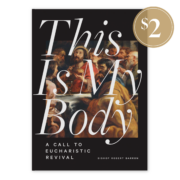Centuries ago, St. Anselm of Canterbury proposed one of the most philosophically interesting arguments for God’s existence ever crafted. It is generically referred to as the ontological argument. St. Anselm argued that given what God is by definition—or in essence—it could not possibly be the case that he does not exist. God, says Anselm, is “that than which nothing greater can be thought.” That is to say, God is the greatest conceivable being.
But is this just a clever act of defining God into existence? Well, not exactly. Indeed, the argument begins with a definition of God—at least a “working” definition. But nonetheless, the argument hinges on more than a definition. It hinges on logic; that is, on what it makes sense to think or say logically.
“Who is greater: one who might be thought to exist, or one who must be thought to exist?”
St. Anselm argues that it is logically contradictory to ponder—and thus to assert—the nonexistence of the greatest conceivable being. It is nonsense. Once one understands that God is the greatest conceivable being, it is as rationally fruitless to think about God’s nonexistence as it is to think about an existing married bachelor. Why? Well, because to think or say that “that than which nothing greater can be thought” does not exist is logically nonsensical given what the greatest conceivable being must be like if he is, well . . . the greatest conceivable being. For which is greater: a God who exists or a God who doesn’t? More to the point, who is greater: one who might be thought to exist, or one who must be thought to exist? There is a sort of Wittgensteinian aspect to this argument, perhaps. What is logically true—or at least, what it logically makes sense to say—reveals itself to us in the very words we use. But this entails that we analyze our words carefully.
Of course, a being who must be thought to exist (in order to remain logically coherent) might still be thought not to exist. The universal human propensity for logical incoherence is a hard truth but presumably all who are blessed to be married know it well. There is none better to point out one’s logical misgivings than one’s spouse (or is that just my experience?). One way or another, even the most cold and clinical thinkers among us can find ordinary clarity of thought attenuated in an instant by thick clouds of emotion. As John Locke once mused, “What worries you, masters you.”

No matter how sophisticated we are, two logically incompatible propositions cannot be combined to make one logical truth. Given the definition of a circle and the definition of a square, we can know, a priori, that no argument for the existence of a circular square can succeed. The same goes for God, on Anselm’s account. If we are to claim that what must be thought to exist does not exist, we commit a logical error.
It is at this point of the argument that most of us will find ourselves suffering from a philosophy-induced headache. This is deep, abstract stuff. But ’tis the stuff of logic. Headache or not, we are right where we need to be if we wish to do natural theology—that is to say, if we wish to rationally discover the existence of God by the natural light of human reason. We are in the arena of philosophy. As I have discussed at length in another article, it is only here where God’s existence can be definitively proved—or disproved. There is no more consequential proposition than that of the existence of the greatest conceivable being. So, the effort and the pain is merited.
St. Anselm thinks that God must be thought to exist because it makes no sense to say that the greatest conceivable being does not exist. The very claim, the very sentence, is absurd in his eyes. And language tips us off to the structure of reality. For if a person understands what God is, then he will know that God exists—and must exist. For it is better to exist in thought and in reality, than purely in thought. God’s existence thus becomes self-evident and to say otherwise is to fall into logical incoherence. And that is why Anselm highlights the beginning of the fourteenth Psalm:
The fool says in his heart, “There is no God.”
(Psalm 14:1)
Thus, it turns out that once we recognize that God is and must be “that than which nothing greater can be thought” (and he must be because anything less would not be God), it seems we cannot deny his existence without committing a definite logical error.
But still, we must acknowledge that this entire argument hinges on an imprecise definition of God. Could this imprecision be enough to undermine the argument?
For, indeed, what is God in essence? We do not know. We can only think and talk about God with imprecisions. This gets at the crux of why many Catholic philosophers often do not favor Anselm’s argument. Following St. Thomas Aquinas, they insist that although the proposition “God exists” is self-evident in itself, it is not self-evident to us. Why? Because we do not know the essence of God—that is to say, we do not know what God is in himself. Our language is too weak to define God. We are bound to speak and think about God only in terms that describe what he is not, or by literary device (e.g., analogy or metaphor). And thus, our minds are too small. God is only self-evident to himself.

Nonetheless, I still wonder whether we are too quick to dismiss St. Anselm’s argument altogether. Maybe to know God “in a general and confused way” (as St. Thomas acknowledges every thinking person does) is enough to know a priori that God exists. To be sure, we cannot know what God is in himself; but we can know something of what God is. The question is: Can we know enough of what God is for an a priori ontological argument to work?
Despite my Thomistic inclinations, there is still something to Anselm’s ontological argument that haunts me. I cannot bring myself to dismiss it outright. Something seems right about it. Perhaps we do not need to know what God is in himself for such an argument to work. Could it be that what we can know about God is enough?
